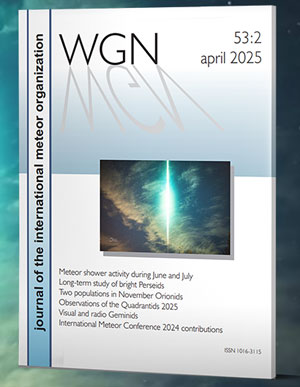Favorable lunar conditions accompanied the maximum of the
2001 Quadrantid meteor shower. Peak activity was expected
near 12h UT on January 3, corresponding to a solar longitude
of lambda=283.16°.
Observers were satisfied by good Quadrantid rates in the UT
afternoon and evening hours of January 3, 2001. Radio forward-
scatter observations as reported by Hiroshi Ogawa, Japan,
showed increased Quadratid activity until 20h UT on January 3,
compared with the background activity of December 30-January 1.
Geometrical effects of radiant direction changes will play
a significant role though.
The highest ZHR value is found for 13h30m UT on January 3
or a solar longitude of lambda=283.24° (J2000.0). The
ZHR of about 130 is a typical value for the Quadrantids,
but the number of reports for the peak period is very small
whence conclusions are tentative. The peak time may easily
shift by one hour to either side once a more comprehensive
dataset is available.
----------------------------------------------------- Date Time (UT) Sollong nObs nIND nQUA ZHR +/- ----------------------------------------------------- Jan 02 2300 282.63 2 2 17 13 9 Jan 03 0230 282.78 5 3 40 26 4 Jan 03 0510 282.89 13 5 109 17 3 Jan 03 0740 283.00 9 5 98 56 6 Jan 03 0940 283.08 10 8 192 61 4 Jan 03 1120 283.15 6 4 90 68 7 Jan 03 1330 283.24 3 2 33 131 23 Jan 03 1500 283.31 4 3 53 118 16 Jan 03 1720 283.41 5 3 76 82 9 Jan 03 1910 283.48 10 5 217 95 6 Jan 03 2110 283.57 5 4 98 79 8 Jan 04 0400 283.86 2 1 19 16 4 -----------------------------------------------------
Solar longitudes refer to equinox J2000.0. nObs is the number
of individual observing periods, nIND is the number of individual
observers providing them, nQUA is the number of Quadrantids
seen. The radiant position was assumed at alpha=230, delta=+49,
the population index used was r=2.1. The expectation value of the
ZHR,
ZHR = (1 + sum nQUA) / sum(Teff/C),
was used for the averages here, where Teff is the effective
observing time and C is the total correction composed of limiting
magnitude, clouds, and zenith correction. Times are rounded to
the nearest 10 minutes.
We are very grateful to the following 23 observers who sent
their reports to the Visual Commission or to the various
mailing lists in time for this first activity overview:
ANDBI Birger Andresen (Norway), MEIMA Marcel Meima (UK),
BIVNI Nicolas Biver (USA), NICTE Ted A. Nichols II (USA),
BURWI Wlliam Burton (USA), PUNNI Nilesh Puntambekar (India),
DAVMA Mark Davis (USA), RENJU Jurgen Rendtel (Germany),
GLIGE George W. Gliba (USA), SPAGE George Spalding (UK),
GODSH Shelagh Godwin (UK), STOWE Wes Stone (USA),
HALWA Wayne T. Hally (USA), TAIRI Richard Taibi (USA),
HASTA Takema Hashimoto (Japan), TUKAR Arnold Tukkers (the Netherlands),
HOSDA Dave Hostetter (USA), UCHSH Shigeo Uchiyama (Japan),
JOHCA Carl Johannink (Germany), YOUKI Kim S. Youmans (USA),
LINMI Mike Linnolt (USA), ZHUJI Jin Zhu (China) and
MCBAL Alastair McBeath (UK).




 You saw something bright and fast? Like a huge shooting star? Report it: it may be a fireball.
You saw something bright and fast? Like a huge shooting star? Report it: it may be a fireball.  You counted meteors last night? Share your results with us!
You counted meteors last night? Share your results with us!  You took a photo of a meteor or fireball? You have a screenshot of your cam? Share it with us!
You took a photo of a meteor or fireball? You have a screenshot of your cam? Share it with us!  You caught a meteor or fireball on video? Share your video with us!
You caught a meteor or fireball on video? Share your video with us!